
One of the most agonizing tortures for women in captivity is the uncertainty of ever reuniting with their children — Lyudmyla Huseynova
Women are frequently captured and held in Russian captivity by the occupiers. Many of these women endure sexual violence in basements and torture chambers. Beyond the physical torment and humiliation, they grapple with the anguish of being separated from their children

New episode of the program «Free our relatives» focuses on women enduring physical, sexual, and psychological violence due to the war initiated by the Russian Federation against Ukraine. In this episode, we engage in a conversation about this pressing issue with Lyudmyla Huseynova, a former prisoner of war, human rights activist, and Communications Director of SEMA Ukraine, along with Anastasia Agafonova, a film director.
SEMA Ukraine is a community that brings together women who have survived war-related sexual violence during the Russian-Ukrainian war, transforming their traumatic experiences into post-traumatic growth. This is how the women, who joined forces in 2019 before the full-scale Russian invasion, now describe themselves since the beginning of the armed Russian aggression. SEMA Ukraine is a part of the global SEMA NETWORK, established by the international organization Dr. Denis Mukwege Foundation. Currently, SEMA Ukraine unites several dozen women who have survived sexual violence.
In our discussion, we delve into the details of the list comprising these remarkable women.
Who are these women?
Lyudmyla Huseynova: All these women, without exception, remain Ukrainian citizens, and this is the sole reason for their arrest and continued captivity. When I was released from captivity a year ago, I was dismayed to discover how little is known in Ukraine about the civilian women held by the occupiers. Their names and faces remain unfamiliar to most. We were advised not to discuss these women openly anywhere, as it supposedly increases their monetization. I found this unacceptable. We must talk about these women; we have no right to forget them. Some on the list have been held since 2017! How can we stay silent about someone like Olena, who has been in captivity for seven years? How else can we raise her value?
A person loses hope when they believe no one is fighting for them. Where will they find the strength to endure if they feel forgotten?
«There is no humanity in Russian captivity and international law is nonexistent within its confines»
Lyudmyla Huseynova: Women endure appalling conditions in Russian captivity, where humanity and adherence to international law seem nonexistent. The Geneva Conventions, often cited to protect civilians from being taken as prisoners, have been largely ignored since 2014, resulting in the capture and torture of civilians.
Disturbingly, at least 80% of both men and women held captive face various forms of sexual violence.
Had we not maintained silence on this issue since 2014 and demanded the establishment of humane conditions in captivity, the staggering numbers of prisoners might not have reached such horrifying levels. It wasn’t until after 2022, when the number of civilian prisoners exceeded tens of thousands, that people began to address the issue.
Regarding the video that visualizes the stories of women who have endured sexual violence
Anastasia Agafonova: We produced a video showcasing the stories of various women who have faced sexual violence. These are documentary narratives sourced from SEMA Ukraine, and you can find several of them on their official website for further reading. We used these stories as the foundation. Initially conceptualized as a performance, the idea evolved into a social video, thanks to the support of the Dr. Denis Mukwege Foundation and SEMA Ukraine.
How many women are on the SEMA Ukraine list?
Lyudmyla Huseynova: While we cannot provide an exact number, we can confirm that there are more than ten such women – these are individuals whose relatives have granted permission to share their stories. The list is continually expanding. On one hand, this is encouraging as it reflects the trust placed in us. However, this list does not encompass my acquaintances, friends, or the women I encountered in captivity. Nevertheless, I am aware of the torment and humiliation they are enduring.
Read: The Crimean political prisoner Mustafayev has been transferred to the colony with harsh conditions of detention located in the Tambov region
Daria Safonova
Lyudmyla Huseynova: I would commence my account with Daria Safonova, a resident of the Luhansk region. Her story dismantles Russia’s narrative, which claimed no resistance to the occupation in the region in 2014. Daria actively participated in pro-Ukrainian rallies from that year onward. Residing in the small town of Chervonyi Luch, on March 9, 2014, she and her husband attended a rally in Luhansk, held in honor of a poet’s birthday at the central square near the Shevchenko monument. Unfortunately, «titushky» (mercenaries – ed.) from Russia arrived and assaulted them, causing injuries to Daria. The police did not protect them.
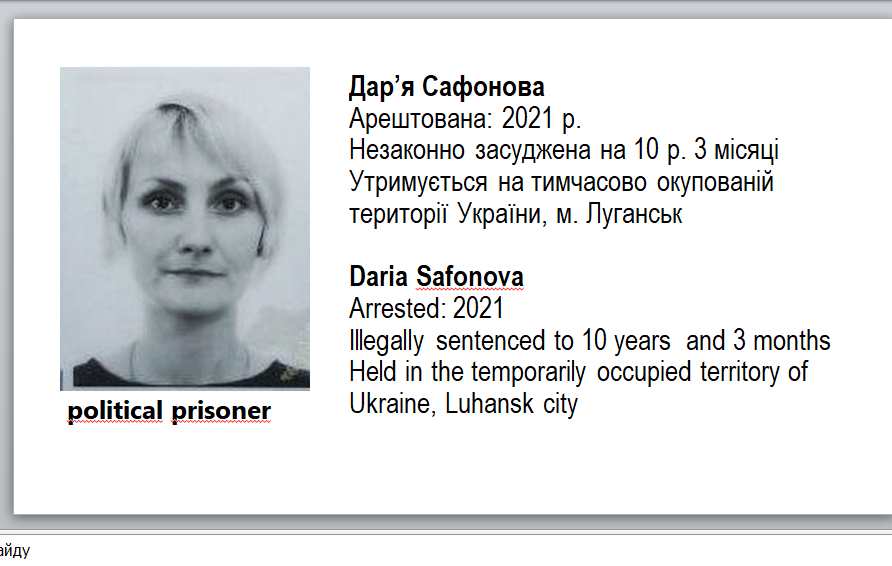
On September 7, 2021, she was forcibly taken. They pulled up, grabbed her, and threw her into the car. I know the ordeal because that’s precisely how they detained me.
Daria was charged with «espionage», declared guilty, and sentenced to 10 years and 3 months by the so-called «court». Presently, she is held captive in the Luhansk region.
Olga Meleshchenko
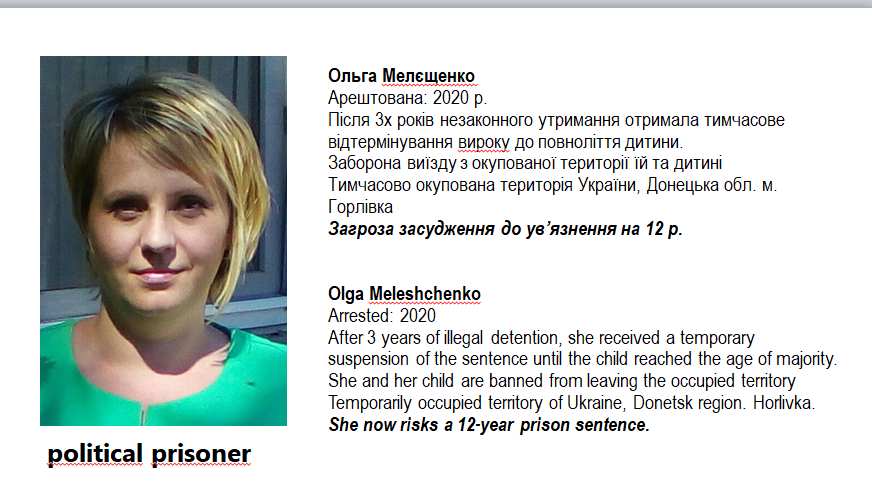
Lyudmyla Huseynova: There are numerous tragic stories, and I’ve previously shared Olya Meleshchenko’s story on your program. Announcing such narratives does yield some impact. Olya underwent a trial and was released from the courtroom, albeit temporarily. Unfortunately, her release is not permanent; it’s suspended until her child reaches the age of majority. When she was arrested, her son was just four years old. While I can’t solely attribute her release to our efforts, I firmly believe that every word of support for these women, every instance of publicizing the harrowing situations they face—like being unable to witness their children grow up—does make a difference. Olya is currently with her son, albeit restricted from using the internet or any telephone connections, but at least she’s not confined within the confines of a cell.
Is it possible to exchange civilian women?
Lyudmyla Huseynova: I was in a women’s exchange during which 108 women, all of them civilians, were released. In October 2022, I held hope that such women’s exchanges would continue, but unfortunately, they did not. We reached out to the International Committee of the Red Cross and various international organizations. I even addressed the UN, emphasizing the inadmissibility of holding women captive. Sadly, the release of women from captivity seems challenging for the world, for reasons unknown.
I’m aware that the Coordination Headquarters in Ukraine, particularly Mr. Lubinets, is actively working on this issue, striving to draw global attention to it. Before the New Year, there was an opportunity to send letters from relatives to women prisoners. I hope our girls received them, and I believe some parcels from the ICRC were delivered. This act is immensely significant for them, confirming that they are not forgotten, that there are people on free territory who care about them.
Why do Russians need prisoners?
Lyudmyla Huseynova: Holding prisoners serves as leverage on our government, as relatives continuously demand the return of their loved ones. We witness constant calls for the release of our relatives. However, it’s crucial to recognize that these releases do not hinge on the will of our government; they depend solely on the will of the Russian Federation. I genuinely hope that the global community will exert influence on the Russian leadership.
Women from the South
Lyudmyla Huseynova: We currently lack a comprehensive list of women captured in the occupied south of the country, but we are actively working to create one. I appeal to the relatives of these captured women: do not hesitate to make this information public. If we remain silent, they (the Russians – ed.) can do anything to them. Another form of psychological pressure from the occupiers is the narrative that no one remembers them, that they have been forgotten. This psychological tactic significantly impacts individuals who lack the opportunity to hear about the support they deserve.
Svitlana Golovan
Lyudmyla Huseynova: I’d like to share the story of Svitlana Golovan, a resident of the small town of Novoazovsk. She was arrested in August 2019, a few months before my arrest. She worked as a carrier, earning a living to support her two small children. Her job involved driving people to Mariupol for various purposes, such as collecting pensions or obtaining documents. However, in August 2019, the ‘MGB’ decided to arrest her. They raided her home, thoroughly searching the premises, and confiscated her child’s laptop, money, and car. All of this transpired in front of her young children.
Her youngest daughter was only four years old at the time. As her mother was taken away, this little child ran after the car, screaming: «Bring my mum back, leave her alone»
The heartbreaking scene unfolded as the children threw themselves under the car in a desperate attempt to stop it. It’s unimaginable what this woman endured, and it reflects the cruel actions of those who subjected her to such trauma in the presence of her children.
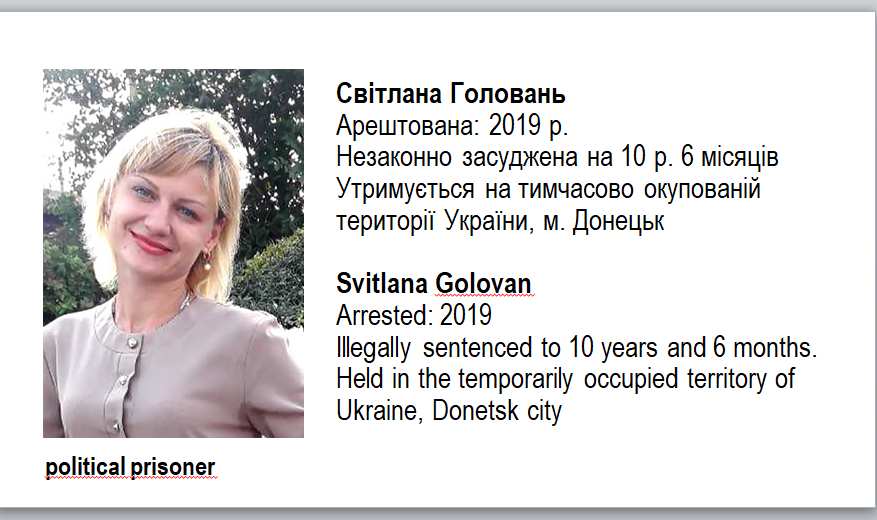
Afterward, she was denied any contact with the outside world for two years. The authorities restricted her access to a private lawyer, allowing only a state-appointed attorney who pressured her to plead guilty. Despite the coercion, Svetlana refused to admit guilt and found herself without legal representation.
For the next two years, she endured torture in «Isolation». Following a «trial» that resulted in a sentence of 10 years and 6 months, she was subsequently transferred to the Snizhne colony.
Read: How «Isolation» chief torturer «Palych» fell into the hands of Ukrainian justice and what happened afterwards
What is happening in the women’s colony in Snizhne?
Lyudmyla Huseynova: We seldom discuss the Snizhne colony, but accounts from released women provide a glimpse into the harsh conditions. Forced labor extends from 8 am to 8 pm, with women compelled to work in sewing workshops, producing clothing for the Russian military. They are granted only one day off per week. The scarcity of water is notable, with women relying on manually transported buckets. Additionally, they carry 50 kg bags of coal.
Any infraction results in the denial of parcels, which are already infrequent—entitled to receive only five or seven kilograms once a month. For those deemed to «misbehave», even this limited privilege is revoked. Visits occur just once a year, and those who continue to defy regulations may be denied this rare opportunity.
However, the most agonizing aspect for Svitlana and other mothers in similar situations is the separation from their children. Six years have passed since Svitlana was taken away, and her youngest is now ten. The uncertainty looms large—will her child remember her, recognize her after six years? Svitlana’s husband has since started a new family and relocated the children to Germany. The children now live with their father, leaving Svitlana in anguish, uncertain if she will ever see them again.
The heartbreaking story of Olga Meleshchenko underscores the emotional toll. After three years of separation, upon leaving the courtroom, she rushed to hug her son, only to have him hide behind his father, saying, «I don’t know this woman; I’m afraid of her».
It is this anguish and heartbreak, compounded by the fear of being forgotten by their growing children, that fuels the fight for women prisoners. Beyond the physical torment, humiliation, and pain they endure, their emotional suffering is intensified by the inability to witness their children growing up.



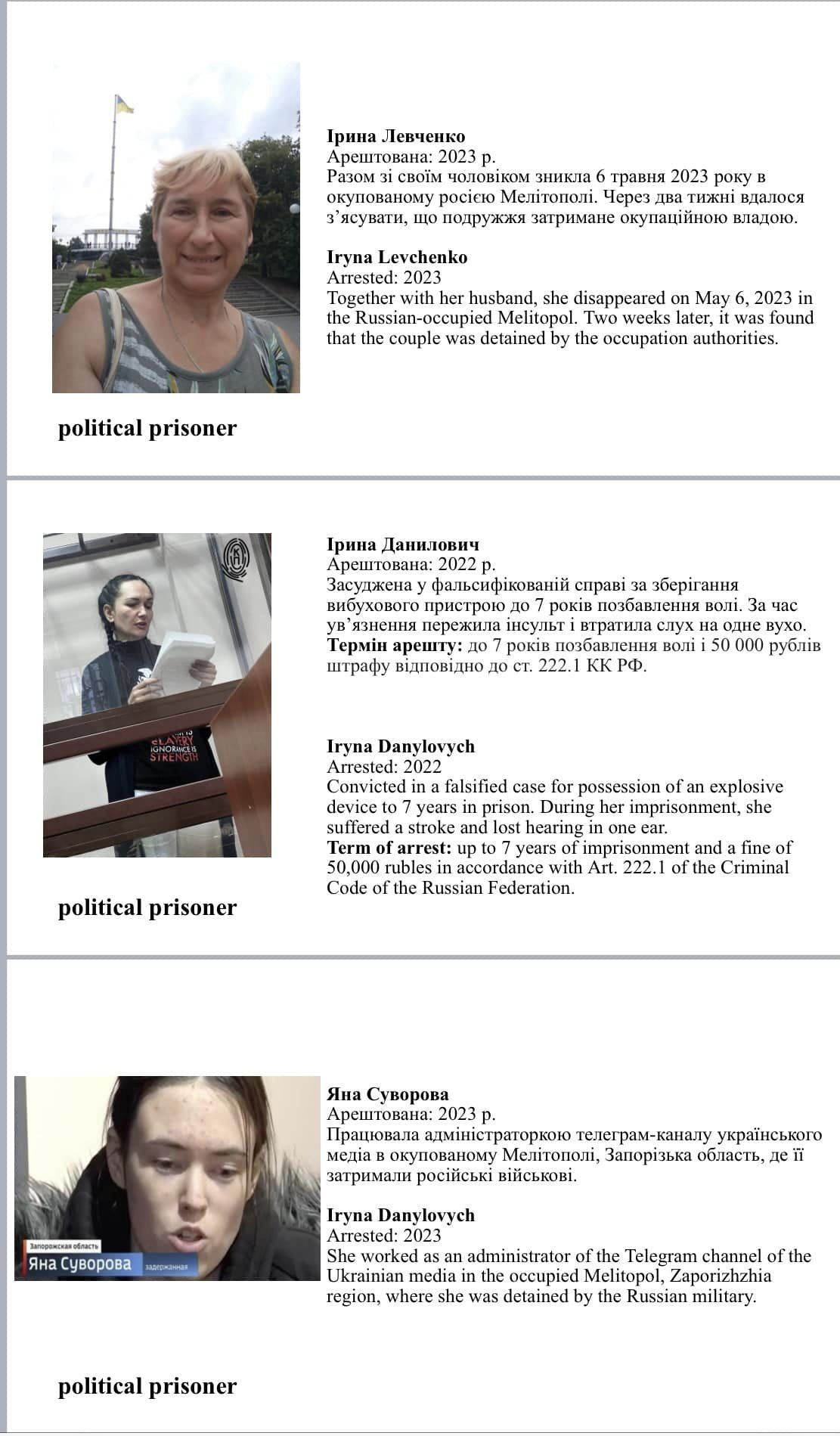
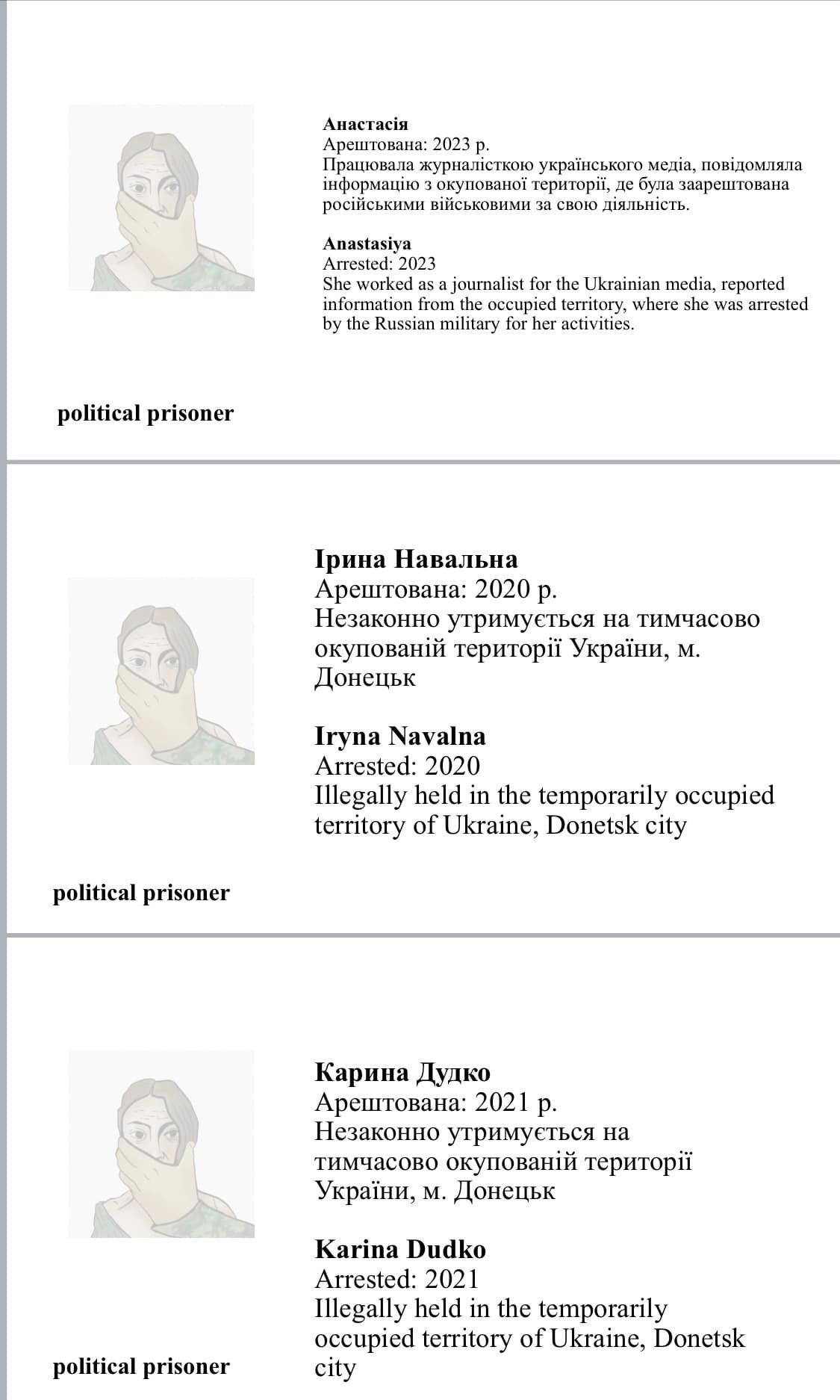
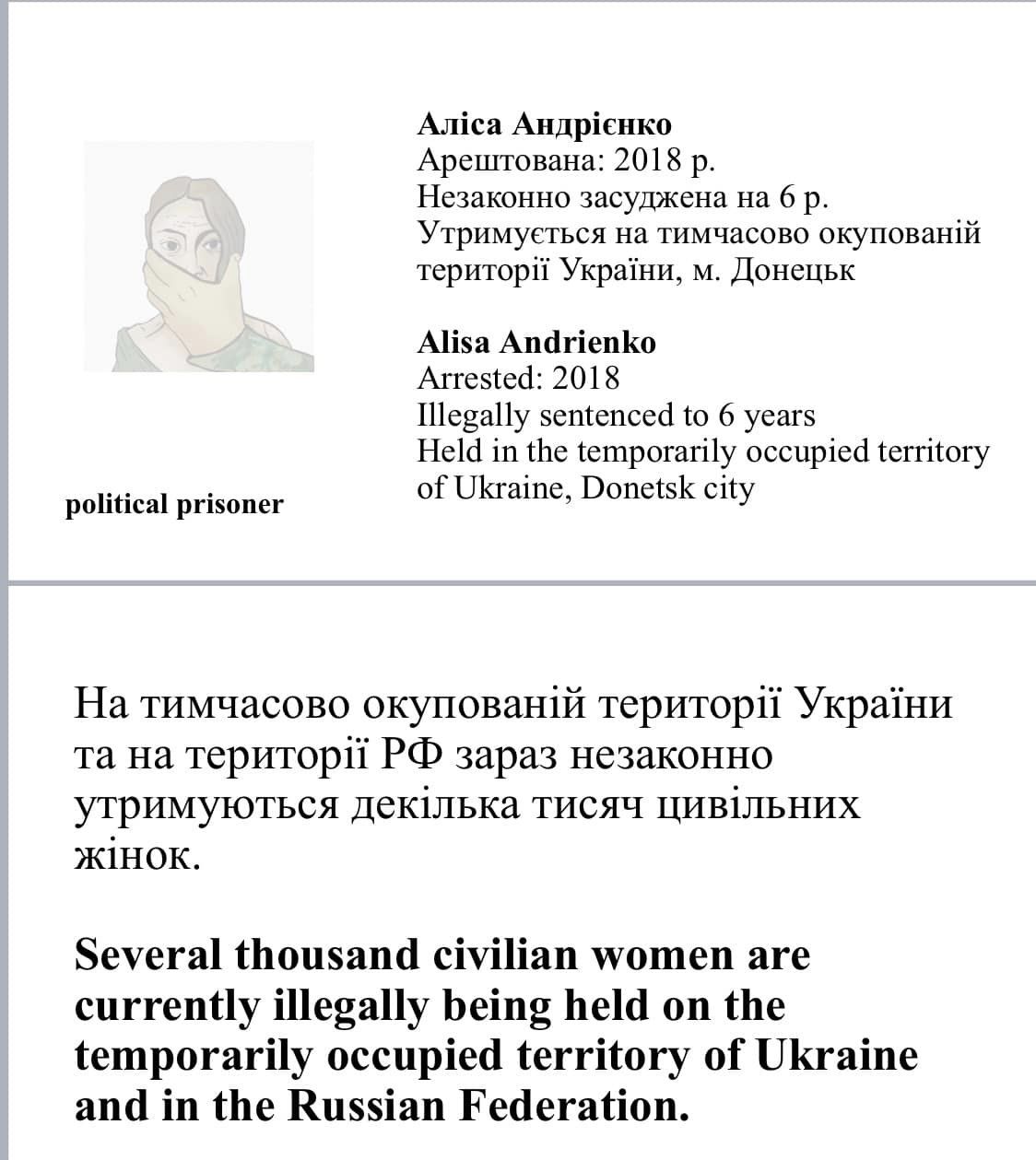
As a reminder, Lyudmyla Huseynova endured 3 years and 13 days in captivity, ultimately regaining her freedom on October 17, 2022. A Ukrainian citizen and resident of occupied Novoazovsk, she served as a public ombudsman for children’s rights in specific districts of Donetsk Oblast. Following the outbreak of hostilities in 2014, she dedicated herself to assisting children from the Novoazovsk orphanage, actively collecting humanitarian aid for them.
In October 2019, militants arrested Lyudmyla on charges of espionage, extremism, terrorism, and calls for the overthrow of the «DPR government». Human rights activists revealed that she spent 40 days in the secret prison «Isolation» before being transferred to the Donetsk SIZO. In recognition of her dedication, Lyudmyla Huseynova was awarded the National Human Rights Award in 2021.
In times of war, the program «Free our relatives» tells the stories of people, cities, villages, and entire regions that have been captured by Russian invaders. We discuss the war crimes committed by the Kremlin and its troops against the Ukrainian people.
The program is hosted by Igor Kotelianets and Anastasia Bagalika.
The coverage of war crimes resulting from Russia’s war against Ukraine is made possible by the support of the American people through the United States Agency for International Development (USAID) in the framework of the Human Rights in Action Program implemented by Ukrainian Helsinki Human Rights Union.
Opinions, conclusions and recommendations presented in this publication do not necessarily reflect the views of USAID, the United States Government. The contents are the responsibility of the authors.


